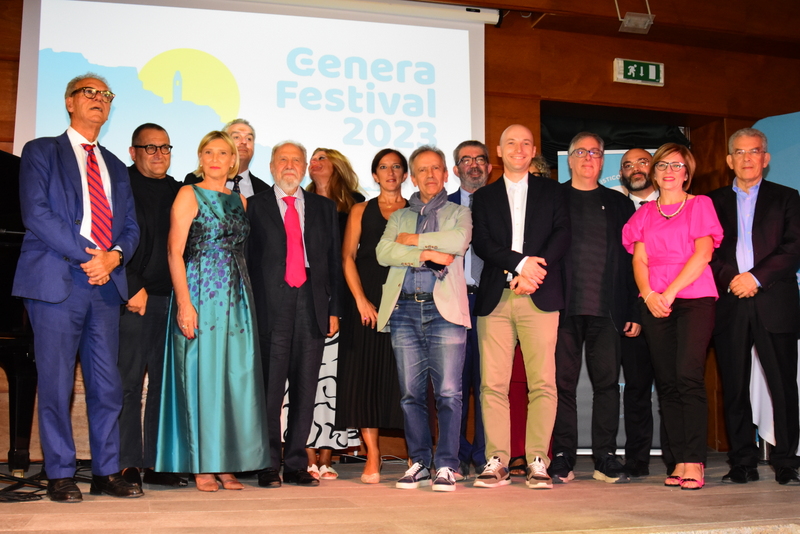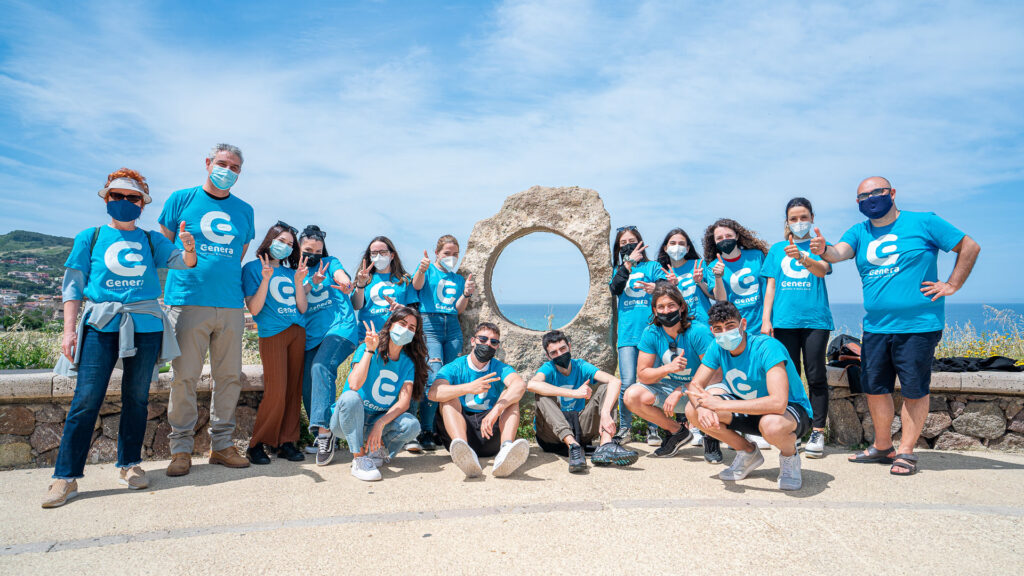La chiusura del Genera Festival si è rivelata una ricca cerimonia che ha visto protagonisti alcuni dei nomi più importanti della stampa nazionale e internazionale. Ad aprire la serata un omaggio a Michela Murgia, recentemente scomparsa: una clip in cui la scrittrice invitava a non aver paura di essere chi si vuole essere, e a rompere le regole. L’elegante location della sala XI del Castello dei Doria ha visto la madrina del Premio Tiziana Ribichesu e Giampaolo Cassitta, direttore artistico del festival, assegnare i premi ai giornalisti selezionati dalla giuria, presieduta da Gianni Garrucciu, dell’edizione 2023 del Premio Giornalistico della Sardegna – città di Castelsardo. “Il Premio ha una lunga storia, dagli anni Ottanta – ha spiegato Gianni Garrucciu –. Con la giuria abbiamo lavorato in modo da individuare dei giornalisti che possano dare un messaggio di speranza alle nuove leve”. La giuria, vero fiore all’occhiello del Premio, è composta giornalisti di rilievo, a iniziare da Francesco Birocchi, presidente dell’Ordine regionale dei Giornalisti. A farne parte anche Maria Pintore, direttrice di Radio Internazionale; Andrea Caglieris, caporedattore del Tgr Valle d'Aosta; Simonetta Selloni, presidente dell’Assostampa Sardegna; Padre Stefano Gorla de Il giornalino; Pasquale Alfieri del Corriere della sera e Giacomo Bedeschi, direttore de La Nuova Sardegna. La consegna dei premi è stata anticipata da un ricordo molto toccante della signora Brigaglia, moglie del professore Manlio Brigaglia “ancora presente, in tutto quello che ha fatto”. Il premio intitolato al grande intellettuale va a Giacomo Serreli di Videolina. Entrato di diritto nella storia del giornalismo sardo, a Serreli è stato riconosciuto il merito di essere un
comunicatore puntuale e scrupoloso, e di far scoprire angoli e storie inedite della Sardegna.
“Ricevo questo premio con un auspicio – ha spiegato Serreli –: che al mio posto un giorno ci siano i vari generini che nei giorni scorsi si sono cimentati in questo campo”. Il premio “Pino Pinna” per il giornalismo sportivo è stato invece assegnato a Simonetta Martellini, figlia del leggendario Nando Martellini. A lei il merito di “riuscire, con la sua voce, non solo a raccontare le notizie ma a descrivere emozioni”. “Molti ricordano mio padre come uno di famiglia – ha detto la giornalista –. È lui che mi ha fatto amare questo lavoro”. Il premio “Le storie” intitolato al giornalista Rai Peppino Fiori, è stato assegnato a Mario Mossa (Rai). “Per la sua capacità, in oltre 40 anni di mestiere, di attraversare con leggerezza e profondità ogni mezzo di comunicazione”. “Per noi cronisti è un momento particolarmente difficile – ha spiegato Mossa –, a causa di un decreto legislativo lacunoso che ha messo in difficoltà le procure, mettendole nella condizione di decidere cosa sia una notizia.” La cronista de La Repubblica Federica Angeli ha ricevuto il premio per il giornalismo d’inchiesta intitolato a Piero Mannironi. Impegnata nell’inchiesta sulla mafia romana, è stata premiata da Eugenio Cossu e Daniela Scano “per l’esempio che rappresenta nel giornalismo di inchiesta che non si ferma davanti a niente”. “Il giornalismo è una professione difficile, specie quando una donna decide di trattare certi temi considerati un tempo maschili, come la mafia – ha sottolineato Federica Angeli –. Questi premi sono degli abbracci che io sento, da tutti voi, e mi fanno sentire meno sola”.
A Marco Bittau de La Nuova Sardegna è andato il premio “Giovanni Canu” per la cronaca. “Questo premio arriva in un momento molto particolare della mia carriera, dopo trent’anni di giornalismo – ha evidenziato Bittau –. In questi giorni a Castelsardo mi sono fermato a parlare con i ragazzi del mondo che cambia; noi giornalisti seguiamo questi cambiamenti, ed è avvincente, quando si ha la passione”. A ricevere il premio per il giornalismo scientifico è stato Andrea Bettini (RaiNews24). Per il canale all-news della Rai, Andrea Bettini ha seguito i principali eventi scientifici degli ultimi anni, aiutando a conoscere da vicino i continenti più remoti della Terra. “Sono molto contento di ricevere questo premio dedicato al giornalismo scientifico – ha dichiarato Andrea Bettini – che dà spazio ai racconti importantissimi di temi come ambiente e scienza”. Un breve video dedicato a Daniela Zedda ha introdotto la consegna del premio a lei intitolato alla reporter Elisabetta Loi, che ha ricevuto il premio per il giornalismo fotografico “per la sensibilità e attenzione verso le persone e le loro storie”. “Ѐ una grande emozione essere qui – ha detto la reporter –. Voglio ringraziare tutti quelli che mi hanno permesso di raccontare le loro storie e la mia famiglia”.
A Bepi Vigna, autore di Nathan Never, è andato il Premio per il Giornalismo a fumetti. “Dare un premio per un fumetto in Sardegna è molto importante. Tra i sardi abbiamo avuto grandissimi autori che hanno fatto la storia del fumettismo italiano – ha sottolineato Bepi Vigna –. Il fatto che il Premio giornalistico di Castelsardo si sia accorto di questo settore così importante per la cultura mi fa molto piacere.”
Il premio alla carriera è andato all’ex direttore de La Nuova Antonio Di Rosa, “uno a cui piace stare dalla parte della gente e che ha sempre denunciato quello che non funziona”. “In questo mestiere l’elemento territoriale vale molto – ha spiegato Di Rosa –. C’è bisogno di raccontare di più il mondo: non fermarci alle beghe politiche”.
Il premio “Città di Castelsardo” è andato a Liliana Faccioli Pintozzi di Sky “per la sua competenza e il suo innato fiuto di giornalista”. “Sono d’accordo sul fatto che ci sia la crisi – ha detto Liliana Faccioli Pintozzi – ma c’è la nostra passione, che andrà avanti. Ci saranno sempre storie da raccontare”. Ad Antonio Caprarica, storico corrispondente esteri della Rai, il premio “Città di Castelsardo” è andato “per la sua genialità nel raccontare, con la professionalità maturata nelle sue numerose esperienze nel mondo”. “Ѐ un premio che devo dividere con una grande pianista che ha anche l’intuito di una grande cronista – ha scherzato Caprarica –, e che mi ha aiutato ad essere ciò che sono: mia moglie. Come giornalista sono stato fortunato; sono stato sempre al posto giusto al momento giusto. Voglio chiudere una massima: una notizia è ciò che il potere non vuole che si sappia: questo è il nostro dovere.”
Ospite musicale della serata è stato il maestro Piero Marras. Ringraziamenti ed applausi hanno chiuso una tre giorni ricca e variegata di fermento culturale, il Genera Festival dà appuntamento al 2024.
_________________________
ENGLISH VERSION
The closing of the Genera Festival turned out to be a rich ceremony with protagonists some of the most important names in the national and international press. To open the evening a tribute to Michela Murgia, who recently passed away: a clip in which the writer invited us not to being afraid to be who you want to be, and to break the rules. The elegant location of room XI of the Doria Castle saw the godmother of the Prize Tiziana Ribichesu and Giampaolo Cassitta, artistic director of the festival, assign the prizes to the journalists selected by the jury, chaired by Gianni Garrucciu, of the 2023 edition of the Sardinia Journalism Award – city of Castelsardo. “The Award has a long history, dating back to the 1980s – explained Gianni Garrucciu -. With the jury we worked in order to identify journalists who can give a message of hope to the new generations”. The jury, the true pride of the Award, is made up prominent journalists, starting with Francesco Birocchi, president of the regional Order of Journalists. Also part of it are Maria Pintore, director of Radio Internazionale; Andrew Caglieris, editor-in-chief of the Tgr Valle d'Aosta; Simonetta Selloni, president of Assostampa Sardinia; Father Stefano Gorla of Il Giornale; Pasquale Alfieri of the Corriere della sera e Giacomo Bedeschi, director of La Nuova Sardegna. The award ceremony was preceded by a very touching memory from Mrs. Brigaglia, wife of professor Manlio Brigaglia “still present in everything she did”. The award named after the great intellectual goes to Giacomo Serreli of Videolina. Entered by right in the history of Sardinian journalism, Serreli has been recognized with the merit of being a punctual and scrupulous communicator, and to help discover unpublished corners and stories of Sardinia. “I receive this award with a hope – explained Serreli –: that one day there will be in my place be the various generani who have ventured into this field in recent days.” The “Pino Pinna” prize for sports journalism was instead awarded to Simonetta Martellini, daughter of the legendary Nando Martellini. She deserves the credit of “succeeding, with her voice, not only to tell the news but to describe emotions”. “Many remember my father as one of the family – said the journalist –. He is the one who made me love this job.” The “Le storie” prize named after Rai journalist Peppino Fiori was awarded to Mario Mossa (Rai). “For his ability, in over 40 years of profession, to cross lightly and depth of every means of communication”. “For us reporters it is a particularly special moment difficult – explained Mossa –, due to a flawed legislative decree that he put in place difficulties for the prosecutors, putting them in the position to decide what constitutes news.”
La Repubblica reporter Federica Angeli received the journalism award of investigation named after Piero Mannironi. She was involved in the investigation into the Roman mafia awarded by Eugenio Cossu and Daniela Scano “for the example that she represents in the journalism of investigation that stops at nothing.” “Journalism is a difficult profession, especially when a woman decides to deal with certain topics once considered masculine, such as the mafia – underlined Federica Angeli -. These awards are hugs that I feel, from all of you, and they make me feel less alone.”
Marco Bittau of La Nuova Sardegna received the “Giovanni Canu” award for news reporting. “This award comes at a very particular moment in my career, after thirty years of journalism – highlighted Bittau –. In these days in Castelsardo I stopped to talk with the kids of the changing world; we journalists follow these changes, and it is compelling, when you have the passion.”
Andrea Bettini (RaiNews24) received the prize for scientific journalism. For the Rai’s all-news channel, Andrea Bettini has followed the main scientific events of the last few years years, helping to get to know the most remote continents of the Earth up close. “I’m really happy to receive this award dedicated to scientific journalism – declared Andrea Bettini – which gives space to very important stories on topics such as the environment and science”.
A short video dedicated to Daniela Zedda introduced the awarding of the award named after her to the reporter Elisabetta Loi, who received the award for photographic journalism “for the sensitivity and attention towards people and their stories”. “It’s a great emotion to be here – said the reporter –. I want to thank everyone who allowed me to tell the story their stories and my family.” The Award for Comics Journalism went to Bepi Vigna, author of Nathan Never. “Give a prize for a comic in Sardinia is very important. Among the Sardinians we had great players authors who have made the history of Italian comics – underlined Bepi Vigna –. The fact that the Castelsardo Journalism Award has noticed this sector which is so important for the culture makes me very happy.” The lifetime achievement award went to the former director of La Nuova Antonio Di Rosa, “someone who likes it being on the side of the people and who has always denounced what doesn’t work.” “In this the territorial element is very valuable in this profession – explained Di Rosa –. There is a need to tell the world more: let’s not stop at political squabbles.” The “Città di Castelsardo” award went to Liliana Faccioli Pintozzi of Sky “for her her competence and her innate flair as a journalist.” “I agree that there is a crisis – ha said Liliana Faccioli Pintozzi – but there is our passion, which will continue. There will be always stories to tell.” To Antonio Caprarica, Rai’s historic foreign correspondent, the “Città di Castelsardo” award went “for his genius in telling, with the professionalism gained in his numerous experiences around the world”. “It’s an award I owe share with a great pianist who also has the intuition of a great reporter – he joked Caprarica –, and who helped me to be what I am: my wife. As a journalist I am been lucky; I was always in the right place at the right time. I want to close one maxim: news is what the power doesn’t want to be known: this is our duty.” The musical guest of the evening was maestro Piero Marras. Thanks and applause closed a rich and varied three days of excitement cultural, the Genera Festival dates back to 2024.




